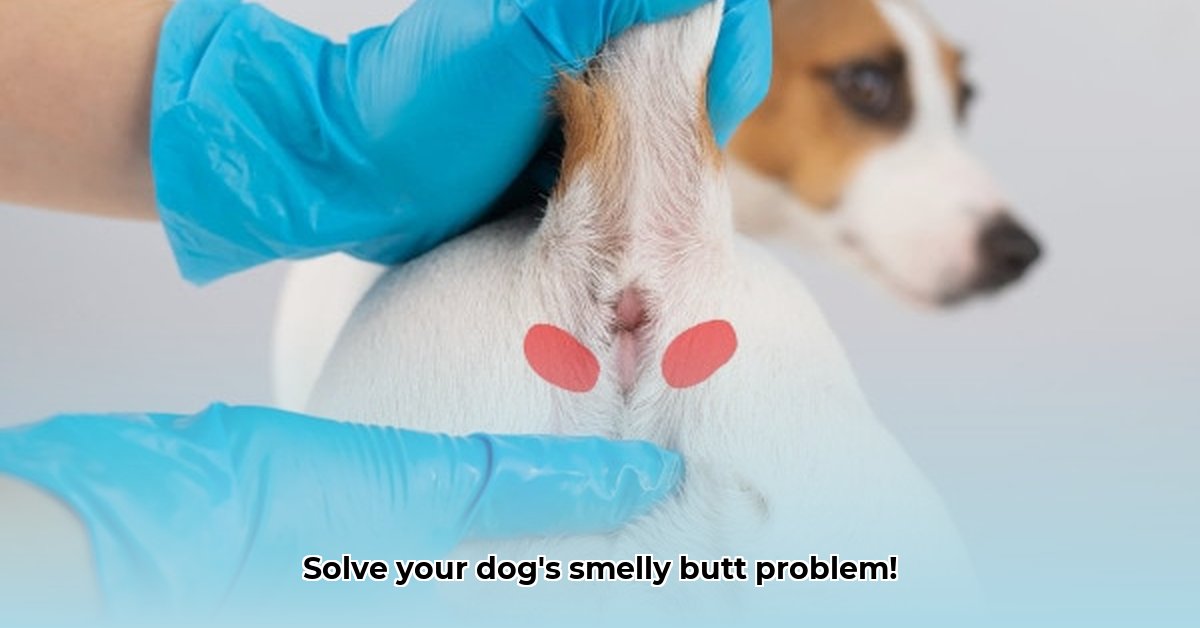Ever caught a whiff of something funky and fishy around your dog? You’re not alone! This guide provides simple steps to understand and address dog anal gland odor, covering identification, safe cleaning, and preventative measures for a happier, less stinky pup. For more on canine health issues, see our guide on nighttime panting.
Decoding Dog Anal Gland Odor: Understanding the Root Cause
That unpleasant, fishy smell likely originates from your dog’s anal glands. Let’s explore this common canine issue, covering causes, solutions, and prevention strategies focusing on long-term health.
Understanding Anal Glands and Their Distinctive Odor
Imagine tiny scent-producing sacs nestled near your dog’s anus. These anal glands secrete an oily, pungent fluid, used in canine communication – think of it as their unique calling card. However, these glands can become impacted, infected, or develop tumors, leading to a strong, unpleasant odor, as well as uncomfortable symptoms like excessive licking or scooting. Are you seeing these signs? If so, it’s time to investigate!
Common Causes of Anal Gland Odor and Impaction
Several factors contribute to unpleasant odors. Impacted glands, where fluid backs up and thickens, are major culprits, preventing natural release and resulting in a potent smell. Infections caused by bacteria can lead to inflammation, further increasing the odor’s intensity and causing pain. Less common causes include anal gland tumors or underlying health issues such as allergies or obesity. Discovering the root cause is crucial for effective treatment and long-term relief.
Tackling Dog Anal Gland Odor: A Step-by-Step Guide
While occasional mild odors may be manageable with gentle home care, strong, persistent, or worsening smells require prompt veterinary attention. This is a sign that something more serious could be brewing. Prompt action ensures better outcomes and prevents complications.
Step 1: Canine Observation Techniques
Become a canine detective! Closely monitor your dog’s behavior, watching for increased licking or scooting of the rear end. Note the odor’s consistency (is it constant or intermittent?) and any additional symptoms like swelling, redness, discharge (blood or pus), or changes in stool. Also, observe any discomfort during defecation. This detailed information helps your vet accurately diagnose the issue.
Step 2: The Importance of Veterinary Consultation
Consulting your vet is absolutely critical. They can accurately diagnose the underlying problem through a thorough physical exam, including palpation of the anal glands, and potentially advanced diagnostic tests like cytology (examining fluid under a microscope) or even biopsies. A proper diagnosis is essential, guiding the most effective and targeted treatment plan. Avoid relying solely on home remedies without professional advice, as this could mask a serious condition and delay proper care.
Step 3: Veterinary-Guided Treatment Options
Treatment varies, depending on the underlying diagnosis. Impacted glands may require manual expression performed by your vet, an expertly executed procedure. Never attempt to do this yourself, as improper technique can cause pain, trauma, and even rupture the glands. Infections often require antibiotics or antifungal medications to combat the infection, sometimes accompanied by anti-inflammatory drugs to reduce swelling and discomfort. In severe cases, surgery may be necessary to remove abscessed or cancerous glands, but this is typically a last resort.
Step 4: Implementing Preventative Measures
Proactive measures are key to reducing the chance of recurring anal gland issues. Maintaining regular bowel movements is essential, as firm stools aid in the natural expulsion of gland secretions during defecation. Does your dog potentially benefit from a high-fiber diet or other digestive aids?
Dietary Adjustments:
- High-fiber foods: Gradually increase fiber intake to promote bulkier, firmer stools. Consult your vet for recommendations on appropriate high-fiber dog foods or supplements like psyllium husk or beet pulp.
- Wet food: Consider incorporating wet food into your dog’s diet. Wet food is often easier to digest than dry kibble, promoting smoother bowel movements and potentially helping with natural gland expression.
Hygiene Habits:
- Gentle cleaning: Use fragrance-free, pet-specific wipes to gently clean the anal area, removing any debris or discharge. Avoid harsh chemicals or alcohol-based wipes, which can cause irritation.
- Avoid harsh scrubbing: Harsh scrubbing can irritate the sensitive skin around the anus, potentially leading to inflammation and further problems.
Home Remedies: Exercise Extreme Caution
While some sources advocate for home remedies like warm compresses or herbal treatments, remember they are temporary solutions at best and may only mask the underlying problem. They might provide temporary relief from discomfort or odor, but they don’t address the root cause of the anal gland issue. Prioritize professional veterinary care, especially when odors persist, or your dog shows signs of pain or discomfort.
Proactive Pet Care: A Foundation for Prevention
Regular veterinary checkups are critical for your dog’s overall health and well-being. Early detection of potential problems, including anal gland issues, leads to more effective treatment and better long-term outcomes. Don’t hesitate to reach out to your vet with any concerns you have about your dog’s health; your dog’s well-being is always worth it!
How to Prevent Recurring Dog Anal Gland Odor Naturally
Key Takeaways:
- A balanced, fiber-rich diet supports regular bowel movements and healthy anal gland function.
- Increased physical activity promotes healthy digestion and overall well-being.
- Addressing any underlying health issues (allergies, obesity) prevents recurring problems.
Preventing recurring odor requires a holistic approach, combining diet, exercise, weight management, and regular monitoring.
Understanding the Source of the Smell
The persistent fishy smell indicates underlying anal gland problems. These sacs secrete a musky fluid that should empty naturally during bowel movements. When this process is disrupted, it leads to impaction, infection, and that telltale odor. It’s estimated that anal gland issues affect nearly 10% of the dog population annually, making it a common concern for pet owners.
Dietary Strategies: The Cornerstone of Prevention
Your dog’s diet has a significant impact on anal gland health. A high-fiber diet adds bulk to the stool, which helps to naturally express the anal glands during bowel movements.
How to Incorporate More Fiber:
- Introduce a high-quality, high-fiber dog food gradually over 7-10 days to avoid digestive upset. Look for foods containing ingredients like beet pulp, pumpkin, or flaxseed.
- Supplement with plain canned pumpkin puree (not pumpkin pie filling!) or psyllium husk. Always consult your veterinarian for appropriate dosage recommendations, as too much fiber can also cause digestive issues.
- If appropriate for your dog and with veterinary guidance, consider a raw food diet with appropriate bone content for added fiber and calcium.
- Avoid processed foods that are high in fillers and low in nutritional value, as these can contribute to digestive problems.
Remember, gradual dietary changes are crucial to prevent digestive upset and ensure your dog adjusts comfortably.
Exercise: Keeping Things Moving
Regular physical exercise benefits the entire digestive system, stimulating bowel movements and aiding in the natural emptying of the anal glands. Aim for daily walks, playtime, and other activities tailored to your dog’s breed, age, and physical condition.
Identifying and Addressing Underlying Issues
Persistent anal gland issues can sometimes signal bigger, underlying health problems. Straining during defecation, scooting, excessive licking of the anal area, or changes in stool consistency can all be signs of infection, inflammation, allergies, or even a blockage caused by a tumor. A visit to the vet is crucial for proper diagnosis and treatment of any underlying conditions.
Gentle Cleaning: Managing Odor
While prevention is the ultimate goal, occasional odor may still occur. When needed, use pet-safe wipes or a diluted solution of mild, hypoallergenic dog shampoo and water to gently clean the anal area. Avoid harsh chemicals, soaps, or fragrances that can irritate the sensitive skin.
Assessing Home Remedies: Proceed with Caution
Some home remedies, such as applying warm compresses or using diluted apple cider vinegar, may offer temporary relief from discomfort or odor, but they are not a substitute for professional veterinary advice. Relying solely on home remedies can mask the underlying problem and potentially delay proper treatment, which can lead to more serious complications.
Professional Help: When to See a Vet
Consult your veterinarian immediately if you notice frequent or foul-smelling anal gland issues, swelling, redness, discharge (blood or pus), or any signs of pain or discomfort in your dog. Early veterinary intervention can prevent serious problems and improve your dog’s overall quality of life. Veterinarians may recommend manual gland expression as part of a comprehensive treatment plan, but avoid routine, at-home attempts to express your dog’s anal glands, as this can cause more harm than good.
Pros & Cons of Manual Gland Expression:
| Feature | Pros | Cons |
|---|---|---|
| Effectiveness | Provides immediate relief from impaction and discomfort | Can potentially damage the glands if performed incorrectly; may lead to dependence on manual expression if underlying causes aren’t addressed |
| Safety | Generally safe when performed by a trained professional | Risk of infection, trauma, or rupture of the glands if improperly performed |
| Cost | Relatively inexpensive compared to surgery or other treatments | Requires ongoing vet visits or professional groomer appointments |
| Long-term solution | Not a long-term solution for underlying issues, but can provide temporary relief | May temporarily alleviate symptoms but doesn’t address the underlying cause of the anal gland |
- Stainless Steel Food Storage for Healthier, Eco-Friendly Meal Prep - February 27, 2026
- Stainless Food Containers Offer Durable Storage for Everyday Meals - February 26, 2026
- Stainless Steel Containers Offer Superior Food Preservation and Durability - February 25, 2026










